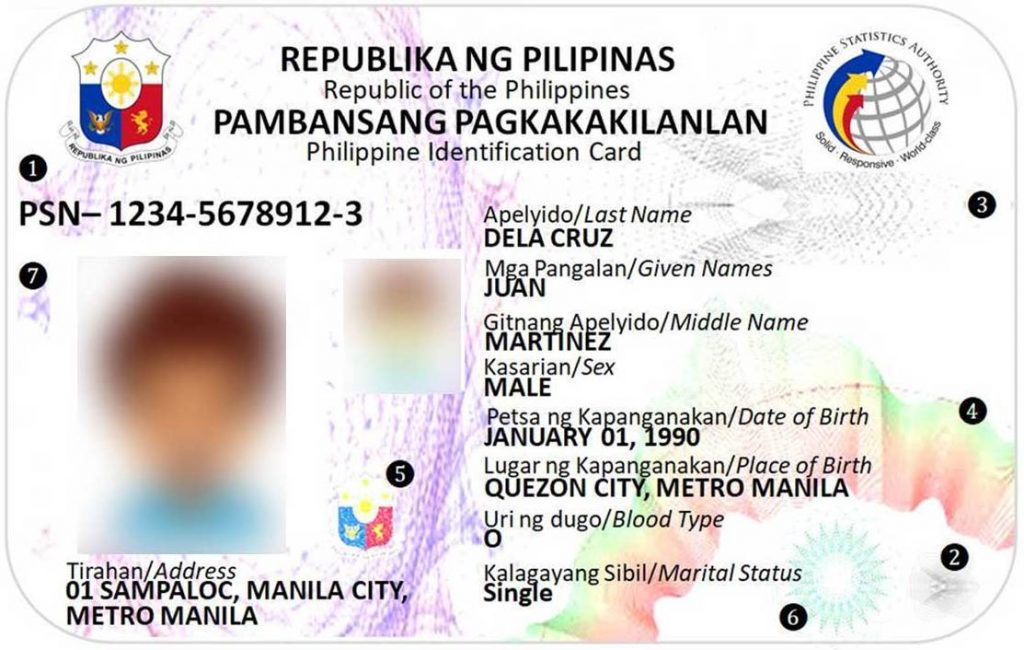News
Nat’l ID pre-registration in 32 provinces starts Oct. 7

FILE: Sample of the front design of the PhilSyS/Philippine Identification Document (ID) card. (Photo By Philippine Statistics Office – Philippine Information Agency, Public Domain)
MANILA – The pre-registration for the implementation of the country’s national ID system would be rolled out in 32 provinces on October 7, an official of the Department of the Interior and Local Government (DILG) said on Friday.
The 32 provinces are Ilocos Sur, La Union, Pangasinan, Cagayan, Isabela, Bataan, Bulacan, Nueva Ecija, Pampanga, Tarlac, Zambales, Batangas, Cavite, Laguna, Quezon, Rizal, Albay, Camarines Sur, Masbate, Antique, Capiz, Iloilo, Negros Occidental, Bohol, Cebu, Negros Oriental, Leyte, Compostela Valley, Davao Del Norte, Davao Del Sur, Davao Occidental, and Tawi-Tawi.
“Itong 32 provinces muna na ito, karamihan dito mababa ang covid cases at walang Metro Manila dito, wala yung mga high risk (areas). ‘Yung iba, for next year na pag na-control na talaga natin itong Covid-19. Ayaw natin madaliin because of the Covid-19 so gumawa tayo ng sistema para makapagsimula na ng proseso. (These 32 provinces have a low number of Covid-19 cases. We don’t have Metro Manila, we don’t have other high-risk areas. The other areas are set for next year once we have controlled the Covid-19 situation. We don’t want to rush, we just came up with a system where we can start the process),” Interior Undersecretary and spokesperson Jonathan Malaya told the Philippine News Agency (PNA) in a phone interview.
He noted these provinces have already coordinated with the Philippine Statistics Authority as well as with the DILG regional offices regarding the matter.
Interior Secretary Eduardo Año, meanwhile, said that appropriate measures have been established to prevent possible Covid-19 transmission during the activity, noting that most of these provinces are under MGCQ already.
“We will deploy additional PNP and barangay officials and volunteers to enforce the safeguards and minimum health standards,” Año said in a message sent to PNA.
Malaya, meanwhile, also said the PSA has requested the DILG “for assistance in securing a memorandum of agreement with various local government agencies”.
Malaya noted the MOA will ensure that the LGUs will provide the PSA with the necessary assistance with regards to “pre-registration, the manpower requirement, in terms of transportation, in terms of crowd control as well as other logistical support”.
“Instead of direct registration, our approach is pre-registration. Ang ibig sabihin ng pre-registration magbabahay-bahay si PSA, ‘yung mga enumerators nila tapos kukunin ‘yung basic data tungkol dun sa mga tao yung kasarian, yung pangalan. (This means PSA would go door-to-door for this. Their enumerators would collect basic data such as gender and names).
There would be a schedule for the collection of other data which would be done at the municipal hall or government office identified by the local government units. There will be no queues,” he said.
Malaya said with this scheme, the number of people who would have their basic data collected at a given time would be limited to ensure physical distancing.
Malaya emphasized that the national ID system aims to harmonize, integrate and interconnect the countless and redundant government IDs with the creation of a single national identification system.
The ID will contain the Philippine identification system (PhilSys) number, full name, facial image, sex, date of birth, blood type, and address of the concerned individual.
In April, President Rodrigo Duterte directed the National Economic and Development Authority (NEDA) to hasten the implementation of PhilSys.
The PSA, an attached agency of NEDA, which is the implementing agency of the national ID system under Republic Act 11055 or the Philippine Identification System Act, expects to begin mass registration in October, with the aim of registering an estimated five million low-income Filipinos by the end of the year.





















